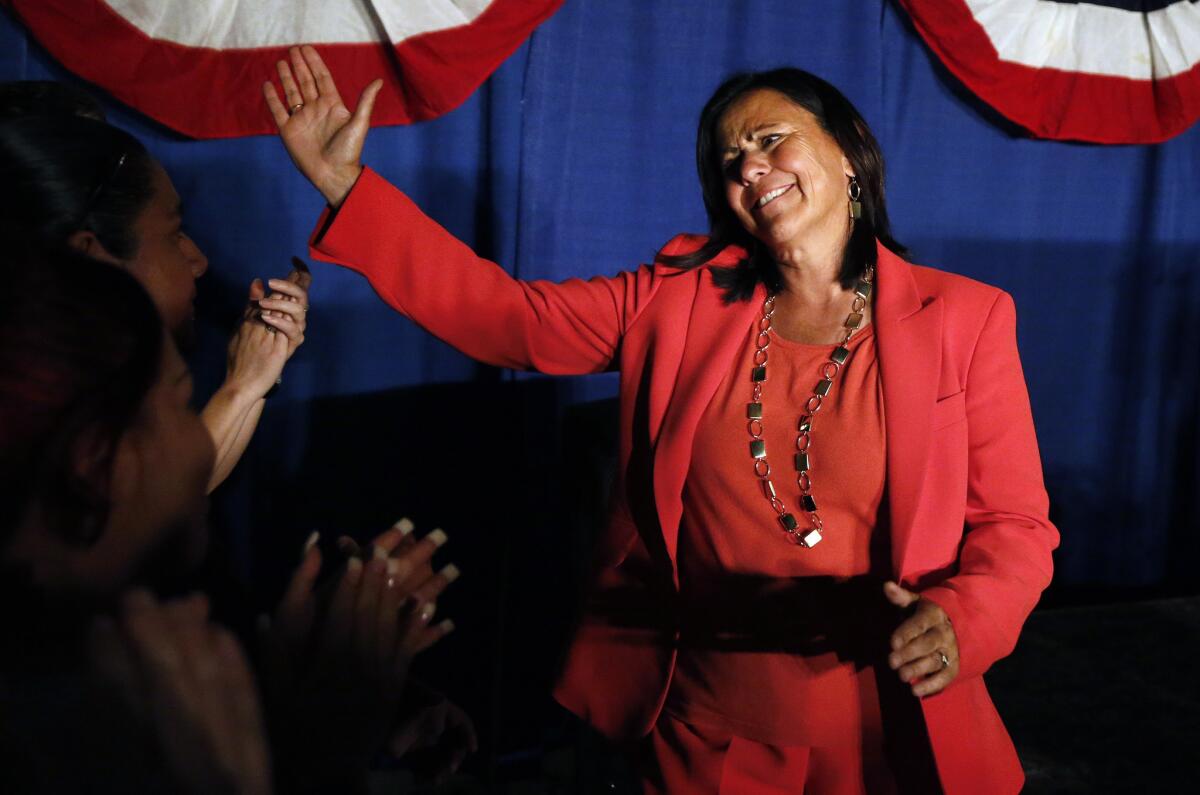Overreach? Colorado suggests California Democrats wise to show restraint

- Share via
DENVER -- The wild and crazy Democratic supermajority in Sacramento has proved more level-headed and a lot less crazy than some liberals hoped and conservatives feared when California voters gave them the run of the place.
The just-completed legislative session was a far cry from Woodstock, as this story in Sunday’s Los Angeles Times noted. Sure, there were things to make a lefty heart go pitty-pat, among them a boost in the minimum wage and a move to make driver’s licenses widely available to immigrants in the state illegally.
But any session that ends with the failure of all but one of 38 bills deemed “job killers” by the state Chamber of Commerce won’t have them singing the Internationale in the streets of Santa Monica and Berkeley.
Credit Democratic Gov. Jerry Brown, who has always been a penny-pincher and more fiscally conservative than most in his party. Credit, too, the survival instincts of majority Democrats, who recognize their bulked-up number includes several more moderate members representing Republican-leaning districts.
Like a booze-fueled binge, any Democratic excess could have brought a terrible hangover in November 2014.
Contrast that temperance in Sacramento with the kick-the-traces approach of Democrats here in Denver, Colorado’s state capital.
The party captured full control of the Capitol in November and its session was a liberal’s fever dream: gun control, boosting organized labor and legalizing gay civil unions, granting in-state tuition and driver’s licenses to immigrants here illegally, mandating new green-energy requirements and putting a $1-billion tax hike, to pay for education reform, on the November ballot.
Comes now the backlash.
Last week, a pair of Democratic legislators -- one of them the president of the state Senate -- were recalled after voting to enact tougher gun restrictions, including universal background checks and a limit on the size of magazines.
There are qualifiers attached to the results, not least a judge’s decision to prohibit the use of mail-in ballots, which is the way most Coloradans are used to voting. A good case could be made that Senate President John Morse of Colorado Springs, who lost by fewer than 350 votes, was defeated the day the judge’s ruling came down.
Harder for Democrats and their allies to explain away is the ouster of Sen. Angela Giron of Pueblo, who represented a heavily Democratic, working-class district with a large population of Latinos -- the voters arguably the most important in Colorado’s swing the last few years from red to blue-tinged purple.
True, it was a special election and those off-year events tend to draw older and whiter, which is to say more conservative, voters. And true, only a tiny fraction of the statewide electorate cast ballots.
But in the days after Tuesday’s recall there was plenty of nervous talk among Democrats around the state about overreach and pushing a bit too hard on the party’s left-leaning agenda.
The state’s first-term Democratic governor, John Hickenlooper, issued a characteristically measured statement Tuesday night, saying he was “certainly disappointed by the outcome.” The next day, at a Capitol news conference, he likened the result to “a line-item veto,” suggesting it was more surgical than sweeping, but also bowed to the widespread pro-gun sentiment in this state filled with hunters and outdoorsmen.
“It’s worth saying Colorado has maintained people’s right to own a gun,” Hickenlooper said. “We’ve maintained the full respect for the 2nd Amendment.”
The recall was just one sign of pushback. In northern Colorado, 11 rural counties are set to vote Nov. 5 on a proposal to break away and form their own state. (“New Braska?” said one snickering Democrat.) The gun laws, which took effect July 1, are just one in a long list of grievances, including the new green energy requirements -- which were aimed at rural electricity providers -- and years of perceived neglect of the region’s roads and education system.
“We’re tired of political leadership that doesn’t care about us and won’t listen to us,” Republican state Sen. Greg Brophy, who represents several of the proposed breakaway counties, said in a telephone interview as he canvassed the state -- 1,100 miles in five days -- as part of a bid for governor. “That’s why I’m running. We deserve a governor who cares about and understands the entire state.”
As Colorado’s gubernatorial race takes shape, there are just about enough prospective GOP gubernatorial hopefuls to fill the Colorado Rockies’ infield. None of them, however, look especially strong at this early stage; with just over a year to go, handicappers in both parties say Hickenlooper looks like a solid favorite to win a second term, albeit a bit less solid than he was before last Tuesday’s election.
Colorado Republicans may still be sorting through their choice of candidates. But at least they’ve found an issue -- those wild and crazy Denver Democrats -- they can run on.
Follow Politics Now on Twitter and Facebook
Twitter: @markzbarabak
More to Read
Sign up for Essential California
The most important California stories and recommendations in your inbox every morning.
You may occasionally receive promotional content from the Los Angeles Times.











